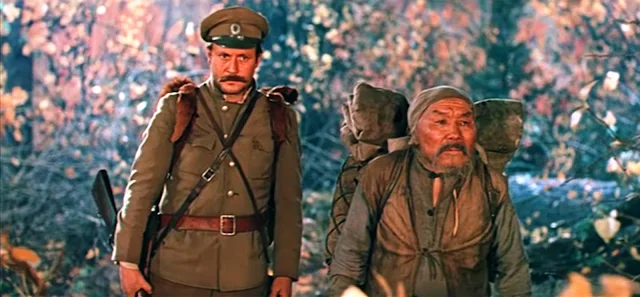 |
| Yuiy Solomin and Maksim Munzuk in Dersu Uzala |
Dersu Uzala: Maksim Munzuk
Anna Arsenievna: Svetlana Danilchenko
Vova Arseniev: Dmitriy Korshikov
Turtygin: Vladimir Kremena
Olenev: Aleksandr Pyatkov
Director: Akira Kurosawa
Screenplay: Akira Kurosawa, Yuriy Nagibin
Based on a book by Vladimir Arseniev
Cinematography: Fyodor Dobronravov, Yuriy Gantman, Asakazu Nakai
Production design: Yuriy Raksha
Film editing: Valentina Stepanova
Music: Isaac Schwarts
Dersu Uzala is at its best when it sticks to being an adventure story about the exploration of what was in 1902 an uncharted region of Russia: the extreme Far East bordering China on one side and the Sea of Japan on the other. Capt. Arseniev heads a company of soldier-engineers trying to establish the topography of the taiga, the forests of the region, when he encounters a permanent resident, a solitary hunter named Dersu Uzala, one of the people now known as the Nanai, but in the film called the Goldi. Dersu leads the surveyors through the taiga and uses his deep knowledge of the region to help them survive the changing seasons. Dersu saves Arseniev's life when the two of them are stranded on the shores of a frozen lake; with night coming on, Dersu has the captain join him in cutting tall grasses which they make into a kind of burrow that allows them to survive the fierce winds. Dersu and the captain reunite five years later when Arseniev returns to the region, and Dersu again saves the captain's life by shoving him from a raft that threatens to be swept away into river rapids. This time, the company of soldiers help Dersu, who clings to a branch in mid-river, make his way to shore. These two great action set pieces are the film's highlights, along with the engaging performance by Maksim Munzuk as the resourceful Dersu. Eventually, the story becomes a little mushy as Dersu begins to lose his sight, endangering his ability to survive alone in the forest. Arseniev persuades Dersu to come home with him to the city of Khabarovsk; Arseniev's wife and son welcome the old man, but the arbitrary demands of civilization are oppressive: Dersu rages, for example, against the fact that people pay for such things as water and firewood that he's used to helping himself to in the forest. This attempt at a critique of civilization feels obligatory and more than a little like a movie formula. But Kurosawa's mastery of blending action with personal drama helps the film over its boggy moments.